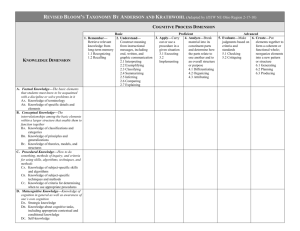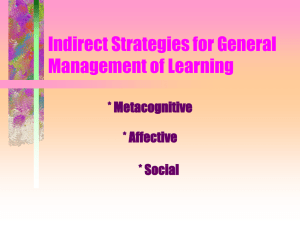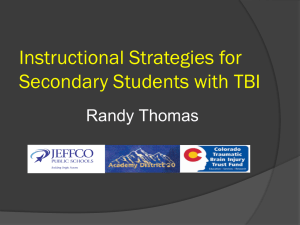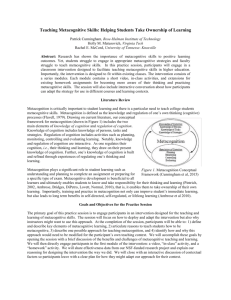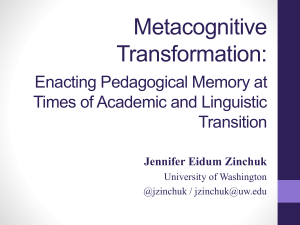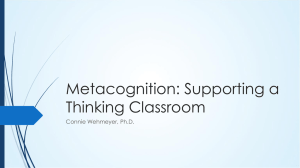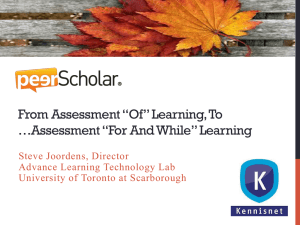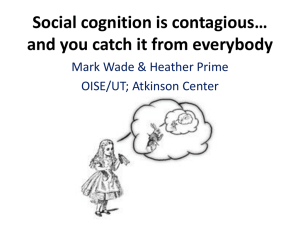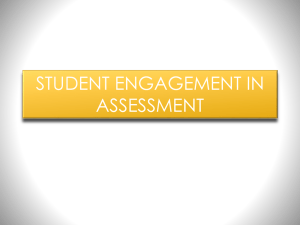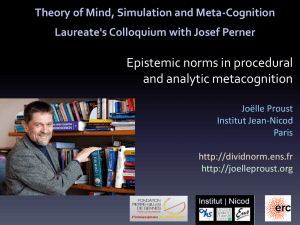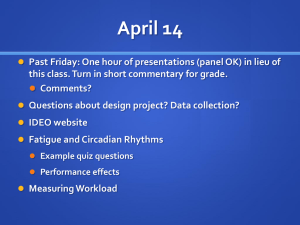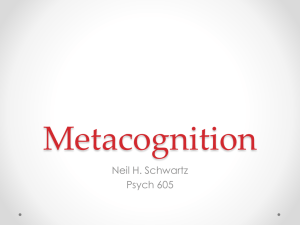Metacognition Theoretical Frameworks to
advertisement
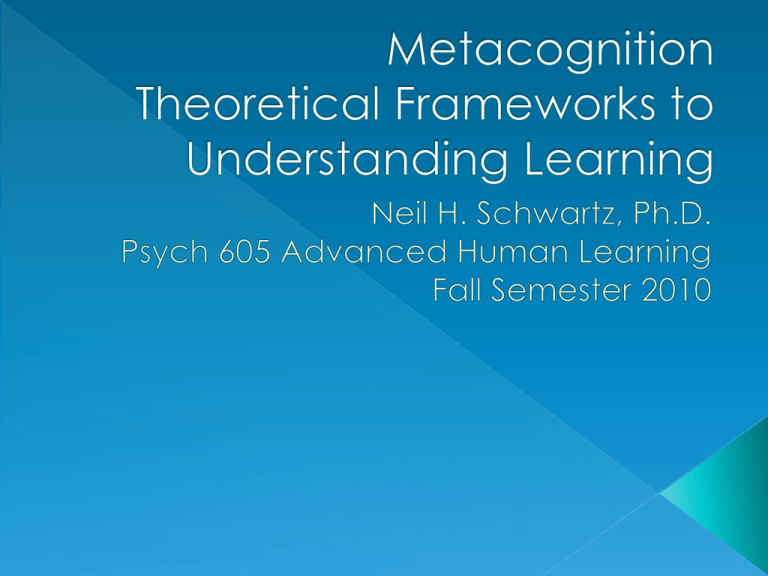
Metacognition refers to a learner’s ability to be aware of and monitor their own learning processes. Usually defined by it’s component parts. Knowledge of cognition Regulation of cognition Refers to what individuals know about their own cognition or cognition in general. Refers to metacognitive activities that help control one’s thinking and learning. Includes three types of metacognitive awareness: Declarative Knowledge Procedural Knowledge Conditional Knowledge Declarative Procedural Conditional knowing about oneself as a learner and about what factors influence one’s performance. Refers to knowledge how to execute procedural skills. Refers to knowing when and why to apply various cognitive actions. Example: capacity limitations, rehearsal, and integration of info into LTM. Example: heuristics and strategies such as how to “chunk” information. Example: knowing when and what information to rehearse. Individuals use knowledge and select skills more automatically. Allows Effective learners appear to use these aspects. students to allocate resources and use strategies effectively. Three essential skills are included in the process of controlling one’s thinking or learning: Planning Monitoring Evaluation Regulation of Cognition Planning Selection of appropriate strategies and the allocation of resources that effect performance. Example: making predictions before reading, selection of strategies and allocation of resources before beginning a task. Monitoring Refers to one’s on-line awareness of comprehension and task performance. Evaluation Refers to appraising the products and regulatory processes of learning. Example: Such as self-testing while learning. Example: Such as reevaluating goals and conclusions. “Is a relatively systematic structure of knowledge that can be used to explain and predict a broad range of cognitive and metacognitive phenomena” (Schraw & Moshman, 1995.) › These theories are personally derived. › And integrate knowledge of cognition and regulation of cognition. Characteristics › Allows an individual to integrate varied aspects of metacognition into a single framework. For example, children have difficulty using knowledge of memory to regulate cognition, because they have not yet integrated metacognitive knowledge and regulatory skills. Characteristics continued: Coordinate beliefs that allow individuals to predict, control and explain their cognition, the cognition of others, or cognition in general. For example, a good strategy user, knows effective learning depends on activating relevant knowledge from memory, selectively using strategies, and motivates oneself to learn material at a deeper level. This guides ands coordinates one’s learning constituting a theory of what it means to be an effective learner. There are three different types of metacognitive theories: Tacit Theories Informal Theories Formal Theories Are unconcious frameworks that systematize metacognitive knowledge. for example, children’s beliefs about intelligence affects behavior in a classroom. Individuals are aware of some of their beliefs and assumptions regarding a phenomena, but have not yet constructed a theoretical structure that integrates and justifies beliefs. › Informal theories start as domain specific, and gradually are generalized to other domains. A systemized approach to learn something that has a specific form or structure (e g. physics, music, or statistics) that needs to be known, used, or remembered. › Allows individuals to make informed choices about self-regulatory behaviors. Cultural Learning Peer interaction Individual Construction When students lack a theory of metacognitive knowledge, they are unable to explain their cognitive performance or plan effectively. › For example, students have difficulty in scientific reasoning due to lack of knowledge of a theory of metacognition. › Students do not differentiate between formal hypotheses and the data used to test these hypothesis, because they lack the skills to think strategically. Many programs do not help students understand the structure of metacognitive theory and use the theory to organize knowledge. Thus, Instructional programs should include: › Ways to help construct metacognitive awareness aiding theoretical formalization. › To accomplish this… Educators need to promote general awareness of the importance of metacognition: › Improve regulation of cognition. › And foster environments promoting metacognitive awareness. Planning Monitoring What is the nature of the task? Do I have a clear understanding ? What is my goal? Am I reaching my goals? What kind of information and strategies do I need? Do I need to make changes? How much time will I need? Evaluating Have I reached my goals? What worked? What didn’t work? What would I do differently next time? Promoting goal orientations in the classroom Vs. performance orientations. › Students with mastery orientations seek to improve their competence, whereas, students with a performance orientation seek to prove competence.
